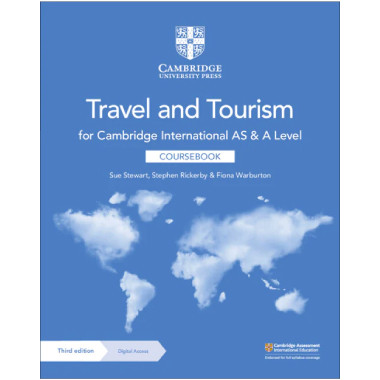 Loading... Please wait...
Loading... Please wait...- 0861 0861 02
- Home
- My Account
- Gift Certificates
- View My Shopping Cart
School Supplies
- Home
- BUY TEXTBOOKS
- CAMBRIDGE (CIE) Textbooks
- AS and A LEVEL
- TRAVEL & TOURISM
- Cambridge International AS and A Level Travel and Tourism Coursebook with Digital Access (2 Years)
Cambridge International AS and A Level Travel and Tourism Coursebook with Digital Access (2 Years)
Product Description
Cambridge International AS and A Level Travel and Tourism Coursebook with Digital Access (2 Years)
Author/s: Susan Stewart, Stephen Rickerby, Fiona Warburton
This series supports learners through the Cambridge International AS & A Level Travel & Tourism syllabus (9395).
From sustainable tourism to managing events, this third edition helps students understand key travel and tourism ideas and equips them with technical and practical skills.
Help students develop their analytical skills to build a deeper understanding of modern tourism, through case studies exploring topics such as conservation and sustainability in the Galapagos Islands.
Suitable for the Cambridge International AS & A Level Travel & Tourism syllabus (9395), for examination from 2024.
The coursebook supports students whose first language is not English, with key terms and concept links, as well as visual tools throughout, to aid understanding.
Features:
-
Activities and contemporary case studies, accompanied by analytical questions, help students refine the key skills needed for further study.
-
‘Travel and tourism in context’ feature enables students to explore topics in a real-world context, to support their understanding.
-
Group work and project work, such as student-led presentations, encourage active learning and support the development of critical thinking skills.
-
Key word definitions, concept links and quick tips provided throughout.
-
Visual tools, such as graphs and diagrams, provide additional language support.
-
‘Reflection’ boxes and self-evaluation checklists encourage students to become independent learners and assess their progress.
-
Exam-style questions help students prepare for assessment.
Contents:
- How to use this series
- How to use this book
- Introduction
- Introduction to command words
- Unit 1 Travel and tourism themes and concepts
- 1.0 Introduction
- 1.1 The changing nature of travel and tourism: Reasons people travel
- Types of tourism
- The changing structure of the travel and tourism industry
- Travel and tourism destinations: Types of destination
- The changing appeal of destinations to different external customer types
- Changes in travel choices
- 1.3 Trends in travel and tourism: Changing global tourism flows
- 1.4 The growth of sustainable tourism: Sustainable tourism meanings
- Reasons for the growth of sustainable tourism
- 1.5 Sustainable tourism in practice: the growth of ecotourism
- Ecotourism products and services
- Responsible and ethical tourism behaviours and practices
- Sustainably managing tourism facilities
- Impacts and attitudes
- 1.6 Customer service in travel and tourism: Providing customer service in travel and tourism
- The importance of quality customer service
- Ways of assessing customer service quality in travel and tourism
- Unit 2 Planning and managing a travel and tourism event
- 2.0 Introduction: A virtual world
- Planning and managing your own event
- 2.1 Working in a team: Overview of team working
- 2.2 Choosing your event: Feasibility studies and the areas to consider
- Investigative methods
- SWOT analysis
- Risk assessment
- Contingency planning
- Financial and accounting methods
- Approvals and legal considerations
- Data protection
- Explaining your choice of event and producing a mission statement
- 2.3 Producing a business plan for your travel and tourism event: Business plan
- Timescales and planning
- SMART Goals
- Ways to monitor and evaluate the event
- 2.4 Preparing for the event: Formal letter and email writing
- Preparation of financial accounts and collecting payments
- Safety
- Data protection and online security
- Forms of marketing
- Itinerary design
- 2.5 Running the event: Time keeping
- Customer care and feedback
- Problem solving
- Evidence of the event
- 2.6 Evaluation and recommendations: Techniques to evaluate the event
- Evaluation of the team
- Personal reflection and self-evaluation
- Ways of improving planning, preparing and running the event
- Unit 3 Destination Marketing
- 3.0 Introduction
- 3.1 Defining the tourism market: Market research and analysis
- The aims of market research and market analysis
- Market research methods
- Market analysis tools and techniques
- Market segmentation
- Visitor profiling
- Product positioning
- Review of the marketing mix
- 3.2 Building a destination brand: Reasons for branding a destination
- Characteristics of an effective destination brand
- Creating a brand identity
- Strategies for launching the brand
- 3.3 Communicating the destination brand: Interdependent stakeholders in the destination branding process
- Communication methods used to raise awareness of the destination's brand identity
- Considerations for selection of communication methods
- Different media used to communicate the destination's brand identity
- 3.4 Challenges in branding destinations: Branding challenges
- 3.5 Monitoring the effectiveness of the destination brand: Methods used to monitor the effectiveness of the brand
- Monitoring resources invested and the results of marketing activities
- Key performance indicators (KPIs) / measures of success
- Unit 4 Destination development and management
- 4.0 Introduction
- 4.1
- Organisations involved in destination management, their roles and priorities: Governments, ministries and National Tourism Organisations
- Local authorities and regional tourism organisations
- Non-governmental organisations (NGOs)
- Commercial organisations
- Destination Management Companies
- 4.2 Destination management: Destination management activities
- Objectives of tourism development and management
- 4.3 Impacts of tourism: Economic impacts
- Environmental impacts
- Sociocultural impacts
- Preparing for Assessment
- Index
- Glossary
- Acknowledgements.


